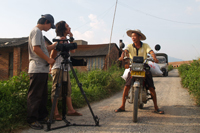
Guangdong: Pigs, Pollution, and Politics

Pig farmer Mr. Liang stops to talk with our crew
Three weeks of filming in China and just over three weeks of blogging….The last stop for the “Meat World: China” documentary team is Guangdong province in the far south of the country. It’s here that industry and animal agriculture meet, in often pungent ways. The region, where the Pearl River flows the South China Sea, is one of China’s main manufacturing zones. (It’s also not far from Hong Kong, which has long been a center of financial services.) The Pearl River is also a locus of large-scale pig production. The waterway contains visual and olfactory evidence.
The crew travelled to Guangdong from Ji’an by road (Jian Yi, with the equipment, by car) and the rest of the crew by rail (a 10-hour journey). Here’s director Jian Yi on the crew’s first day in Guangdong. “We visited Mr. and Mrs. Chen, who own a factory that produces sweaters for export, and had interesting conversations. Mrs. Chen, however we tried, simply refused to believe that the meat industry had any impact on climate change.”
Her response was somewhat unexpected – “surprising and interesting,” Jian Yi says – since she’d expressed concern about the environment and knew about deforestation and global warming. “She was very stubborn…she just wouldn’t believe it.” And like most people interviewed in Jiangxi and throughout Guangdong during the course of the filming, “she believes that pig manure is good fertilizer and is very well dealt with.”
In 2008, the government, concerned by manure pollution in the Pearl River, decided that no more pig farms could be established in the delta; although such facilities will be allowed (and encouraged, in some cases) in other parts of Guangdong. This builds on a 2003 ban on pig factory farms along the river in Dongguang City’an event raised by a spry old farmer the team encountered next, in the city of Huizhou. It’s a region of Guangdong where small-scale pig farms are still common.
 |
“We bumped into an elderly gentleman who owns the largest farm (with 500 pigs) [in Huizhou],” Jian Yi reports. Riding a motorbike, Mr. Liang stopped on the roadside and was keen to chat. He related that larger factory farms had moved to Huizhou, from Dongguan City, where they can’t operate any longer, and now threaten his small, family-run business. He fears he won’t be able to compete. But like Mrs. Chen, he wasn’t concerned about the effects of pig waste, or the quantity of it produced. “Like his peers, he also owns fish ponds, into which he throws all the pig manure to feed fish and ducks at the same time,” Jian Yi writes. He and other farmers even sell the excess pig manure to people with fish ponds.
Pollution does, though, remain a political issue. “We also got a chance to film a little river polluted by both industrial waste and farm waste,” Jian Yi continues. Some of the local villagers agreed to talk to the crew about their anger and concern. “Most, however, hid away from our camera,” fearful of government officials’ reactions if they saw the footage. Previously, some have experienced “bad lessons” (retaliation) when they’ve answered interviewers’ questions. No officials have seen the footage, nor did any interfere with the crew’s work.
As the shoot nears its end, an animated dinner takes place with the crew hotly, loudly and unexpectedly, debating two final interviewees, and each other, about the ethical and ecological complexities unearthed by the filming. To capture it, the camera was, for a few minutes, turned in the opposite direction. That story and a few more from the shoot in Guangdong, coming up next.
 Brighter Green
Brighter Green




